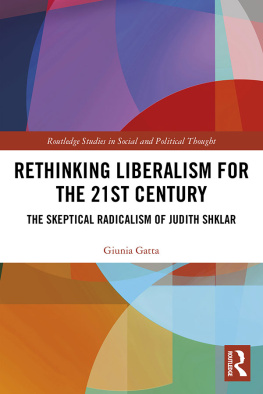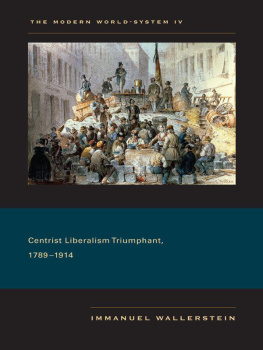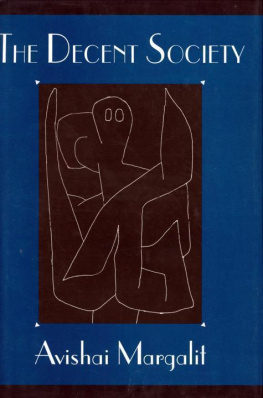Table of Contents
Pages
Rethinking Liberalism for the 21st Century
Rethinking Liberalism for the 21st Century offers an indispensable re-examination of the life, work, and interventions of a prominent liberal political theorist of the 20th century: Judith Shklar.
Drawing on published and unpublished sources including Shklars correspondence, lecture notes, and other manuscripts, Giunia Gatta presents a fresh theoretical interpretation of Shklars liberalism as philosophically and politically radical. Beginning with a thorough reconstruction of Shklars life and her interest in political theory, Gatta turns her attention to examining the tension between Shklars critique of the term modernity and her passion for Enlightenment thinkers, including Rousseau and Hegel. In the second part of the book, Gatta roots Shklars liberalism of permanent minorities in her work in the history of political thought, and highlights this contribution as a fundamental recasting of liberalism as the political philosophy of outsiders. She makes a compelling argument for a liberalism of permanent minorities that refuses to stand on the ground of firm foundations and, instead, is oriented by complex understandings of cruelty and fear.
Rethinking Liberalism for the 21st Century is a much-needed reorientation of traditional liberal policies, allowing for a more meaningful intervention in many contemporary debates. As such, it will be of interest to scholars of political theory, the history of political thought and ideas, philosophy, international relations, and political science in general.
Giunia Gatta is an adjunct professor in the Department of Policy Analysis and Public Management of Bocconi University, Italy. Her research interests span the history of political thought, continental political theory, liberalism, and existentialism. She is particularly interested in how certain political experiences defy state boundaries, so her work frequently crosses over into research on international relations, especially international ethics, international political theory, and human rights.
Routledge Studies in Social and Political Thought
For a full list of titles in this series, please visit www.routledge.com/series/RSSPT
Imaginaries of Modernity
Politics, Cultures, Tensions
John Rundell
Complexity, Society and Social Transactions
Developing a Comprehensive Social Theory
Thomas Whalen
Critical Theories and the Budapest School
Politics, Culture, Modernity
Edited by John Rundell and Jonathan Pickle
Social and Political Life in the Era of Digital Media
Higher Diversities
David Toews
Towards a Hermeneutic Theory of Social Practices
Between Existential Analytic and Social Theory
Dimitri Ginev
Experiencing Multiple Realities
Alfred Schutzs Sociology of the Finite Provinces of Meaning
Marius I. Bena
Human Flourishing, Liberal Theory and the Arts
Menachem Mautner
Rethinking Liberalism for the 21st Century
The Skeptical Radicalism of Judith Shklar
Giunia Gatta
Norbert Elias and the Analysis of History and Sport
Systematizing Figurational Sociology
Joannes Van Gestel
Rethinking Liberalism for the 21st Century
The Skeptical Radicalism of Judith Shklar
Giunia Gatta

First published 2018
by Routledge
711 Third Avenue, New York, NY 10017
and by Routledge
2 Park Square, Milton Park, Abingdon, Oxon, OX14 4RN
Routledge is an imprint of the Taylor & Francis Group, an informa business
2018 Taylor & Francis
The right of Giunia Gatta to be identified as the author of this work has been asserted by her in accordance with sections 77 and 78 of the Copyright, Designs and Patents Act 1988.
All rights reserved. No part of this book may be reprinted or reproduced or utilized in any form or by any electronic, mechanical, or other means, now known or hereafter invented, including photocopying and recording, or in any information storage or retrieval system, without permission in writing from the publishers.
Trademark notice: Product or corporate names may be trademarks or registered trademarks, and are used only for identification and explanation without intent to infringe.
Library of Congress Cataloging-in-Publication Data
A catalog record for this title has been requested
ISBN: 978-0-8153-8383-3 (hbk)
ISBN: 978-1-351-20539-9 (ebk)
Typeset in Times New Roman
by Wearset Ltd, Boldon, Tyne and Wear
For Leonardo
At eighteen, liberally agonistic
Contents
Acknowledgments
It has become something like an academic clich to note, at the outset of a books acknowledgment section that this book has been a long time in the making. Well, this one has been a really, really, really long time in the making. I first met Shklar half my lifetime ago, in a bright library in Barcelona, via the magnificent tribute paid to her by her friend Stanley Hoffmann in Political Theory.
Shortly after reading that article, I turned to Marco Geuna at the University of Milan with just a vague idea about wanting to write my undergraduate thesis on Shklar. To him these pages owe the greatest debt, not because he was one of the few I could turn to with this topic, in a department skeptical about philosophy on the other side of the Atlantic, but because in draft after draft after draft he caught with the same mercilessness conceptual sloppiness, typos, and bibliographic oversights. That he retained some consideration for my intellectual abilities after all that, remained a mentor and a friend after all these years, and still guides a devoted group of young and not-so-young-anymore scholars makes me even more grateful. At those early stages, Mirella Larizza also provided guidance, as well as an unreachable example of erudition, elegance, and beauty, scholarly and otherwise. Her sudden death (just like Shklars) has left many lost, but her legacy endures.
Not too long before meeting Shklar, I had made another fateful encounter, this time on a plane. A charming young economist sitting beside me feigned interest in Heidegger, and found a way to my heart. I still think he is the smartest person I know, after all these years. Back then (after a few dates scattered around Europe), he graciously let me stay at his place in Cambridge, Massachusetts so that I could indulge my curiosity about Shklars work, published and unpublished. Amartya Sen, one of his advisors, kindly opened the doors of the Harvard Library System for me, and Gerald Shklar the containers of Judith Shklars papers and correspondence at the Harvard University Archives. I spent too much time with those papers those many years ago, and I regret not one second of it. In fact, those days at Widener, Lamont, and Pusey library convinced me that I wanted to spend my life surrounded by books and people who loved them.
It remains a source of amazement for me that so many established scholars many of whom later on became intellectual role models would back then engage with a scrappy, clueless undergraduate students questions about Shklar. Bruce Ackerman, Jonathan Beecher, Stanley Hoffmann, Stephen Holmes, Bonnie Honig, Isaac Kramnick, Martha Nussbaum, Patrick Riley, Rogers Smith, Nathan Tarcov, Maurizio Viroli, and Bernard Yack all either met with me, talked to me over the phone, or replied to my queries via email. I was even more amazed that one of these scholars Bernard Yack would remember our conversation more than 20 years later and would provide insightful comments on substantial portions of this manuscript.












